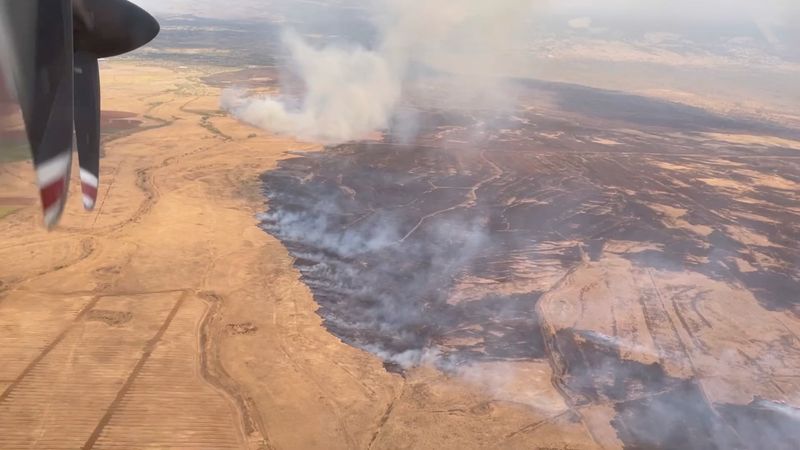By Jonathan Oatis
(Reuters) -Wildfires on Hawaii's Maui have killed at least 106 people, forced tens of thousands of residents and tourists to evacuate the island and devastated the historic resort city of Lahaina. It's the deadliest U.S. wildfire in more than a century. The Big Island of Hawaii is also battling wildfires, which have caused no fatalities.
Here are some key questions and answers about the blazes:
ARE THE MAUI FIRES STILL BURNING?
Firefighting crews were still battling flare-ups. The largest fire in Lahaina was 85% contained as of early Wednesday and had burned 2,170 acres (880 hectares), Maui County said, adding that there were no active threats . Another fire in upcountry/Kula was 75% contained and had charred 678 acres. Smaller fires elsewhere were 100% contained or extinguished.
The fires, which started the night of Aug. 8, wreaked widespread destruction in Lahaina. The city of about 13,000 people on northwestern Maui was once a whaling center and the Hawaiian Kingdom's capital, and now draws 2 million tourists a year.
Cadaver dogs searched Lahaina's charred ruins for victims, and officials said it was likely the number of dead would rise.
The fire destroyed or damaged more than 2,200 buildings, 86% of them residential, officials said. The Federal Emergency Management Agency (FEMA) estimates it will cost $5.5 billion to rebuild the town.
HOW DOES THE DEATH TOLL COMPARE WITH THAT OF OTHER FIRES?
The Maui blaze is the deadliest U.S. wildfire since 1918, when northern Minnesota's Cloquet Fire, which raged for more than four days, claimed 453 lives, according to the National Fire Protection Association (NFPA). The deadliest wildfire in U.S history, Wisconsin's Peshtigo fire in 1871, killed 1,152.
Hawaii's fires also constitute the most lethal disaster to hit the islands since a tsunami that killed 61 people in 1960, a year after Hawaii became a U.S. state.
WHAT ABOUT HAWAII'S DISASTER WARNING SIRENS?
Some Maui residents have questioned whether more could have been done to alert them. Witnesses said they had little warning, describing their terror as the blaze destroyed Lahaina in what seemed like minutes. Some people dove into the Pacific Ocean to escape.
Sirens stationed around the island - intended to warn of impending natural disasters - never sounded, and widespread power and cellular outages hampered other forms of alerting.
Hawaii Governor Josh Green vowed on Sunday to investigate the response and emergency notification systems.
HOW DID THE FIRES START?
The causes of the fires have not yet been determined. The National Weather Service had issued warnings for the Hawaiian Islands for high winds and dry weather - conditions ripe for wildfires.
Nearly 85% of U.S. wildfires are caused by humans, according to the U.S. Forest Service. Natural causes include lightning and volcanic activity.
In Hawaii, less than 1% of fires are due to natural causes, according to Elizabeth Pickett, co-executive director of the Hawaii Wildfire Management Organization. The Hawaiian Islands have six active volcanoes, including one on Maui.
The spread of flammable non-native grasses in areas of former farmland and forest has created large amounts of small, easily ignited materials that increase the risk and severity of fire.
Record-setting heat this summer has contributed to unusually severe wildfires in Europe and western Canada. Scientists say climate change, driven by fossil fuel use, has led to more frequent and more powerful extreme weather events.
WHY DID SHARES OF HAWAIIAN ELECTRIC FALL?
Hawaiian Electric Industries (NYSE:HE) shares have lost half their value this week amid growing scrutiny over whether the utility's equipment played any role in the wildfires.
On Monday, the stock plummeted just moments after the opening bell due to residents filing lawsuits claiming it was responsible for the fires. Shares continued dropping on Tuesday, and the S&P downgraded Hawaiian Electric's credit rating to junk status. The ratings agency cited damage caused to the company's customer base and the lawsuits.
Hawaiian Electric did not respond to requests for comment. On Friday, before the lawsuits were filed, the company said it was working with Maui County to investigate what happened.
